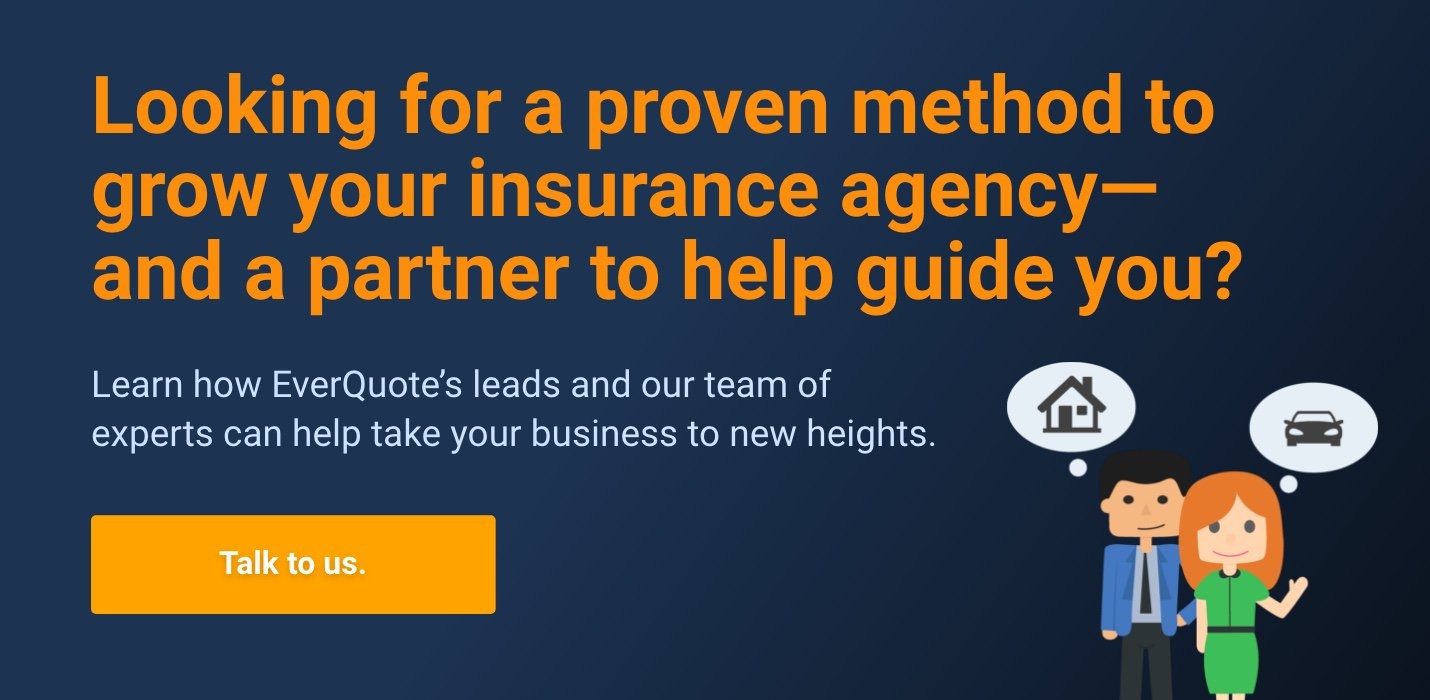- Home»
- EverQuote Pro Blog»
- Looking For Insurance Agency Funding? Here Are Your Options
Looking For Insurance Agency Funding? Here Are Your Options

Creating a new insurance agency is a complex process, just like building any new business from the ground up. One of the most crucial—and often intimidating—parts is figuring out how to fund your brand new venture.
Securing insurance agency funding can be similar to acquiring funds for any other startup if you choose to look for small business loans through traditional bank processes. However, there is an alternative way to obtain a loan for an insurance agency that doesn’t exist for typical businesses.
Before you commit to a certain path, take a look at your options below. Depending on your situation, you might find an advantage in opting for one particular type of insurance agency loan over the other.
Insurance agency funding options: Which is best for your circumstances?
1. Get a small business loan through a bank or another traditional lender.
Like most startup owners, you have the option of walking into a bank and asking for a small business loan from their lending department.
You’ll fill out an application, discuss the terms of the loan, and jump through a few hoops to demonstrate that you’re a reliable borrower who the bank can safely take a chance on. The exact hoops will vary based on the lending institution you choose, but in general, you’ll have to show:
- A good personal credit score. If yours is above 690, you’re in good shape, but some lenders are willing to look at scores as low as 500 if you can prove you have a solid business model and a proven means of generating cash flow.
- Revenue. It can feel like a chicken-or-the-egg dilemma when you’re asked to demonstrate revenue before you can even secure an insurance agency business loan. Unfortunately, most traditional lenders like to see a minimum threshold of monthly or yearly revenue before they’ll agree to hand over any cash.
- A decent track record for your business. If you’ve been operational for a while already, you can expect the bank to take a close look at how successful you’ve been so far. This goes beyond the revenue you bring in; lending officers will want to see your rate of growth over time, the amount of money you’ve personally invested into the business, and at least a year of business bank statements as proof. If you haven’t had your doors open for long, focus your energy on putting together the last piece of the puzzle:
- A solid business model and plan for the future. When you take out a small business loan, you’re essentially promising the bank that these funds will propel your business to new heights; this success is what will allow you to pay back what you owe. Count on the bank wanting to see the details of exactly how you plan to make this happen.
Obtaining a small business loan isn’t exactly a walk in the park, but it’s doable if you have a great plan for moving forward and you’re willing to be meticulous with your documentation.
For many small business owners, a bank loan is the best or only choice.
Thankfully, insurance startups have an extra option on the table.
2. Obtain a loan through your insurance carrier.
Most major insurance carriers, such as Allstate or Farmers, offer business loans for insurance agents in-house.
These carrier loans frequently come with more favorable loan terms and an easier approval process, since the application is geared specifically toward insurance agencies rather than small businesses in general. Bank lending officers aren’t necessarily familiar with the process of building and running an insurance agency, whereas a carrier lender works exclusively with insurance agency startups and knows what to expect.
Additionally, there are some extra benefits that kick in once you’ve secured the loan.
Many of the captive carriers allow for a time period—typically two years, though this varies by the carrier—where you can focus on growing your business before you have to begin paying back the loan. This isn’t always the case with a traditional bank loan.
Plus, once you begin paying back your loan, the carrier will take it directly out of your earned commissions. There’s no stack of bills piling up every month that you must pay back, like with a traditional loan; the money simply comes out of your commission checks. If you aren’t yet earning enough commissions by this point, the carrier may be willing to work with you on devising other payment plans.
The catch to this option is that you might be asked to self-fund the loan. Allstate, for example, requires about $200,000 in available capital before they’ll approve a loan.
Just like with traditional loans, however, these terms will vary based on the carrier you choose. Goosehead Insurance, for example, only requires about $20,000 as an investment. In return, you’ll get to run your own franchise under their umbrella.
Securing insurance agency funding through a carrier can be a great way to get started, but it does come with its own share of hoops to jump through. You’ll still have to fill out an application with much of the same information required for a traditional loan, and you’ll still have to prove that you have a solid business model, a reliable way to generate revenue, a good business track record, and a decent personal credit score. In some cases, you might even encounter an extra hoop:
Many carriers—Goosehead included, but they’re far from the only example—will only approve a loan if you can bring your own lead source with you. They’ll give you the funding and the systems you need to run your business, but you’ll be in charge of showing that you have a robust pipeline of prospects ready to go.
How do you choose which funding option is right for your situation?
There’s not necessarily a right or wrong answer. It’s a highly personal decision that will be affected by your individual circumstances. You’ll want to weigh a few factors before you make your choice:
- Do you want to be a captive agent, bound to a specific carrier in exchange for the convenience of carrier funding?
- Would you rather deal with the hassle of a traditional small business loan but retain the freedom to sell policies for a number of different carriers?
- Can you scrape together the cash required to self-fund a carrier loan?
- Would you prefer to work with a lending agent who knows the insurance industry well, or are you comfortable with proving your business model to a bank lender who may not understand the business?
For most people, it’s less about choosing the correct option and more about being certain you have your ducks in a row before you go looking for funds. The sad truth is, most new insurance agencies—like most small businesses—fail before they get off the ground.
If you’re new to the insurance industry, understand that you’ll be relying primarily on commissions from policy renewals that may not hit your bank account until far in the future. When you have a fresh loan for $200,000 or so burning a hole in your pocket, it can be all too tempting to blow it all on upfront costs such as office space and lead purchases, not understanding that it will take a year or two to break even on almost any policy you sell.
Once you thoroughly understand how insurance sales and revenue works, you can start looking for funding.
Part of demonstrating a successful business model is having a full pipeline of leads ready to go.
Even if your chosen lender doesn’t require you to have an established lead source, it’s still a good idea to know ahead of time where your leads will come from.
For one thing, having this plan in place shows your lender that you’ve done your homework and you’ll have a reliable source of revenue soon. For another, you can hit the ground running with confidence and not have to endure the stress most business owners feel when their expected income falls short of their projections.
You may not yet have the funds to purchase many leads right now, but we would still welcome you reaching out to EverQuote. We can begin to build a relationship together, help you narrow down your ideal lead candidates, and get you all set to take off like a rocket once you’re ready.
Unlock predictable growth with EverQuote.
Our representatives are standing by to help you succeed.
Call 844-707-8800
Weekdays, 9AM-5PM (ET)
Call 844-707-8800
Weekdays, 9AM-5PM (ET)
Accelerate your growth.
Complete the form below or just call 844-707-8800 to learn how we can help you achieve your goals.
By clicking "Get Started", I consent by electronic signature to being contacted by EverQuote, including by automatic telephone dialing and/or an artificial or prerecorded voice (including SMS and MMS - charges may apply), regarding EverQuote for Agents, even if my phone number is listed on a Do Not Call Registry. I also understand that my agreement to be contacted is not a condition of purchasing any goods or services, and that I may call (844) 707-8800 to speak with someone about EverQuote for Agents.
By clicking "Get Started", I affirm that I have read and agree to this website’s Privacy Policy and Terms of Use, including the arbitration provision and the E-SIGN Consent.
* Mandatory fields
 Product Overview
Product Overview Blog
Blog FAQs
FAQs Webinars
Webinars eBooks & Resources
eBooks & Resources